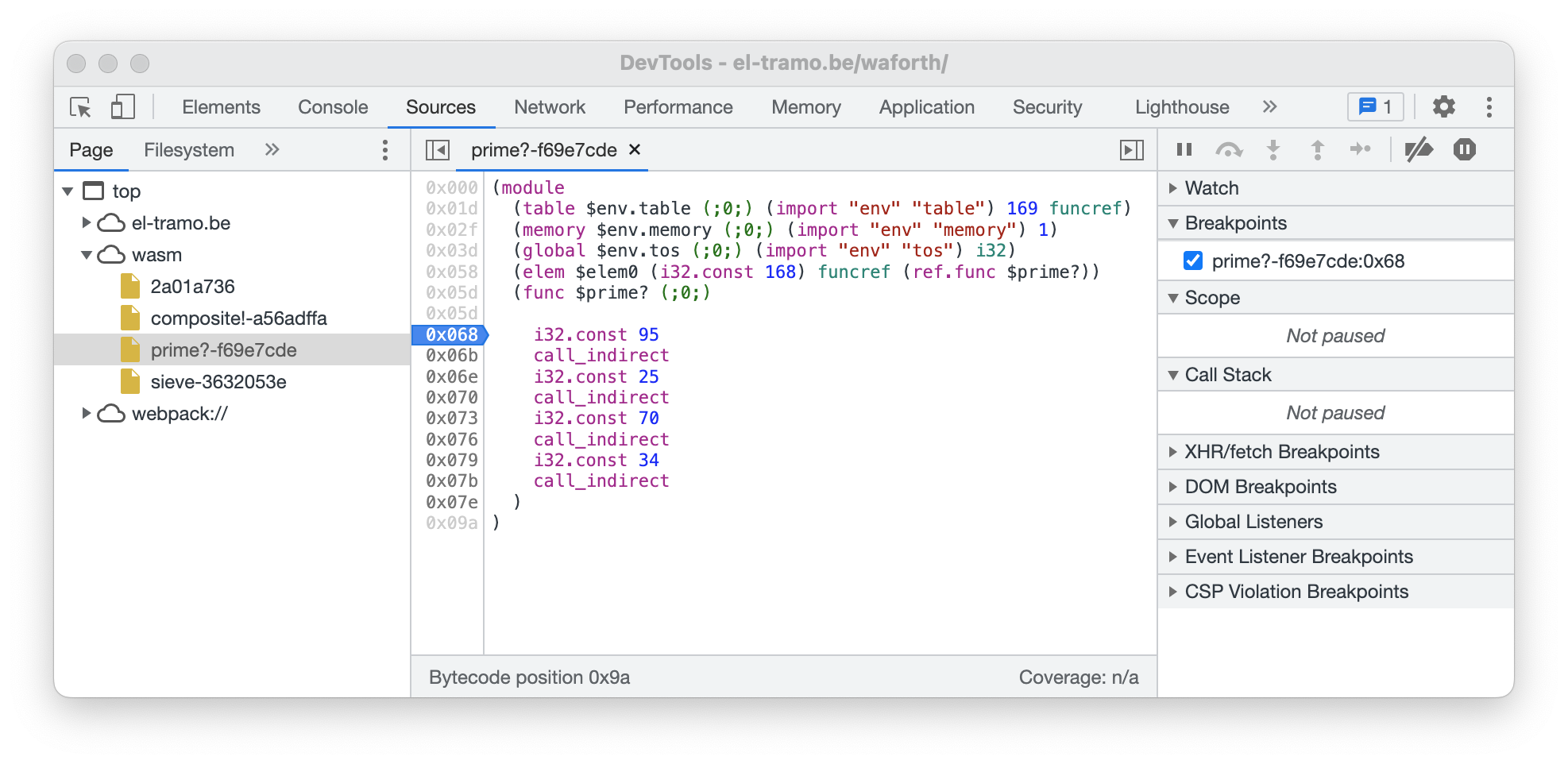| .github/workflows | ||
| .vscode | ||
| doc | ||
| public | ||
| scripts | ||
| src | ||
| .eslintignore | ||
| .eslintrc.yml | ||
| .gitignore | ||
| build-web.js | ||
| LICENSE.txt | ||
| Makefile | ||
| package.json | ||
| README.md | ||
| test-web.js | ||
| yarn.lock | ||

WAForth: Forth Interpreter+Compiler for WebAssembly
WAForth is a small bootstrapping Forth interpreter and dynamic compiler for WebAssembly. You can see it in a demo here.
It is entirely written in (raw) WebAssembly, and the compiler generates WebAssembly code on the fly. The only parts for which it relies on external (JavaScript) code is to dynamically load modules (since WebAssembly doesn't support JIT yet), and the I/O primitives to read and write a character to a screen.
The WebAssembly module containing the interpreter, dynamic compiler, and all built-in words comes down to 13k (6k gzipped), with an extra 7k (3k gzipped) for the JavaScript wrapper and web UI.
WAForth is still in an experimental stage. It implements most of the ANS Core Words, and passes most of the Forth 200x Test Suite core word tests.
Install Dependencies
The build uses the WebAssembly Binary Toolkit for converting raw WebAssembly text format into the binary format, and Yarn for managing the dependencies of the shell.
brew install wabt yarn
yarn
Building & Running
To build everything:
make
To run the development server:
make dev
Testing
The tests are served from /waforth/tests by the development server.
You can also run the tests in Node.JS by running
make check
Design
The WAForth core is written as a single module in WebAssembly's text format.
The Interpreter
The interpreter runs a loop that processes commands, and switches to and from compiler mode.
Contrary to some other Forth systems, this system doesn't use direct threading for executing code. WebAssembly doesn't allow unstructured jumps, let alone dynamic jumps. Instead, WAForth uses subroutine threading, where each word is implemented as a single WebAssembly function, and the system uses calls and indirect calls (see below) to execute words.
The Compiler
While in compile mode for a word, the compiler generates WebAssembly instructions in binary format (since there is no assembler infrastructure in the browser). Since WebAssembly doesn't support JIT compilation yet, a finished word is bundled into a separate binary WebAssembly module, and sent to the loader, which dynamically loads it and registers it with a shared function table at the next offset, which in turn is recorded in the word dictionary.
Because words reside in different modules, all calls to and from the words need
to happen as indirect call_indirect calls through the shared function table.
This of course introduces some overhead, although it appears limited.
As WebAssembly doesn't support unstructured jumps, control flow words
(IF/ELSE/THEN, LOOP, REPEAT, ...) can't be implemented in terms of more
basic words, unlike in jonesforth. However, since Forth only requires
structured jumps, the compiler can easily be implemented using the loop and
branch instructions available in WebAssembly.
Finally, the compiler adds minimal debug information about the compiled word in the name section, making it easier for doing some debugging in the browser.
The Loader
The loader is a small bit of JavaScript that uses the WebAssembly JavaScript API to dynamically load a compiled word (in the form of a WebAssembly module), and ensuring that the shared function table is large enough for the module to register itself.
The Shell
The shell is a JavaScript
class that
wraps the WebAssembly module, and loads it in the browser. It provides the I/O
primitives to the WebAssembly module to read and write characters to a
terminal, and externally provides a run() function to execute a fragment of
Forth code.
To tie everything together into an interactive system, there's a small console-based interface around this shell to type Forth code, which you can see in action here.

